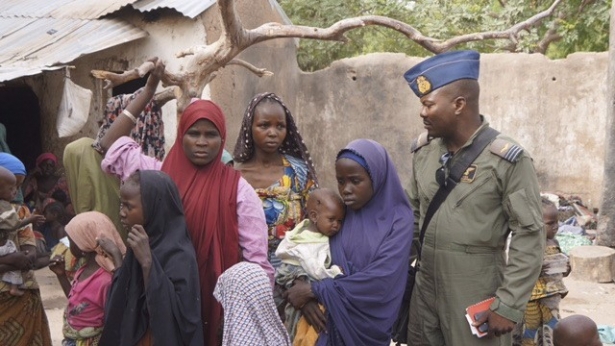More than 200 women and children rescued last week by the Nigerian military from Boko Haram’s stronghold in the Sambisa Forest in Borno State, Nigeria, are said to be pregnant and two brave women from the group have spoken out about their harrowing experience with the militant Islamic group.
On April 28, 234 women and children were rescued from Boko Haram in northeast Nigeria and sent to a refugee camp in Yola where they are being treated and receiving aid. According to the United Nations Population Fund, which is providing support to the rescued hostages, at least 2 – 14 of them are visibly pregnant.
“A large number of girls and women rescued from Boko Haram have been found to be pregnant,” said Stéphane Dujarric, spokesman for United Nations Secretary General Ban Ki-moon. “We do not know yet the total number of pregnant girls among those rescued. The screening is still ongoing.”
A reported 677 women, most of whom were abducted in the past nine months, have been rescued from the Islamic militants in recent weeks.
Among them is Asabe Aliyu, a 23-year-old mother of four who was abducted from Delsak village in northeast Nigeria six months ago by Boko Haram. She recalled being raped repeatedly by different men on a daily basis and even being forced to marry one of her attackers.
“I was abducted six months ago in Delsak when our village was overrun by Boko Haram,” the pregnant and teary-eyed Aliyu, told Nigerian paper The Daily Times. “First I had sojourned from my village to a forest close to Cameroun, they turned me into a sex machine. They took turns to sleep with me. Now, I am pregnant and I cannot identify the father.”
Hundreds more, including 27-year-old Lami Musa, suffered the same ordeal and in addition to being physically and emotionally abused and tortured, she recalled being subject to deplorable living conditions at the Boko Haram camp in northeast Nigeria.
“They abducted the whole of my family and killed my husband at Kilkasa forest when I was four months pregnant. They took us to Sambisa forest, we were sleeping in an open field. For days, we went without water or food,” said Musa, while clutching her 3-day-old baby. “As I am talking to you, I cannot ascertain the status of her health. I have not had a bath since I was delivered of the baby. The baby is yet to be bathed too.”
In an interview with The Christian Post Thursday, pastor Laolu Akande, executive director of the Christian Association of Nigerian-Americans, said he believes the militants raped and impregnated the women out of sheer “evil-mindedness.”
“What this has shown us is the outright, evil-mindedness of the terrorists. They believe that when they impregnate women like that, they will produce children who will not be catered for in this society who will then grow up becoming disgruntled in society and ultimately become terrorists,” said Akande. “To them, it’s part of the enlargement of their evil ideological commitments to keep it going and raise children who will become terrorists.”
According to Akande, children of rape surviviors are often born into complex circumstances making them ideal targets for terrorist recruitment.
“It’s a very precarious situation to have somebody raped, many people can’t decide how they’re going to raise that kind of a child,” he said. “You look at the child and then you remember the evil that was done to you, so they were hoping that these children who would be raised of these very nefarious pregnancies, not that anything is wrong with the children, but their plan and their strategy is to raise children that will continue their [evil].”
Nearly 300 female captives were rescued from Boko Haram last week during raids by the Nigerian military and then transported to safety after three days on the road. Many are said to be traumatized and distressed and subsequently UNFPA is providing counseling to help them adjust back into normal society.
The U.N. agency is said to be providing aid in the form of donated food supplies, reproductive health kits and dignity kits to assist with childbirth at the Malkohi camp outside the city of Yola. In the last year, UNFPA has taken deliveries of over 16,000 pregnancies in northeast Nigeria, although it is unclear whether they are all related to the terrorist group.
“Boko Haram were cruel to them,” said UNFPA executive director Dr. Babatunde Osotimehin, according to Daily Mail. “They were denied food and denied sleep. They were used almost as slaves. They were forced to cook for the Boko Haram fighters and look after them. Sometimes they were used as sex slaves. At least 2 – 14 have been made pregnant and there are stories of rape.”
The rescue comes more than one year after the militant group abducted 276 female students from Chibok, Borno, prompting the global campaign “Bring Back Our Girls” to encourage their safe return. Officials have said the Chibok abductees were not among those rescued in the Sambisa forest.
“One year of captivity is a long time for anyone to bear,” said Osotimehin on the one year anniversary of the famous abduction. “It has been a year full of unimaginable suffering and anguish, not just for the girls, their families and their communities, but also for the world at large. It is time for the girls and all other abductees to resume their lives in peace. It is time for this nightmare to come to an end.”
For nearly six years Boko Haram has wreaked havoc in northeastern Nigeria and killed thousands of innocent civilians, mostly Christians, in the name of terrorism. Experts say the group, which advocates a strict form of Shariah law, is the second deadliest terrorist group in the world after Afghanistan’s Taliban.
Source : Christian Post



